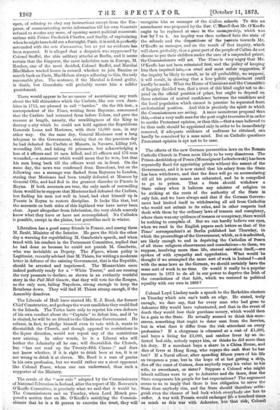There would appear to be no means of ascertaining any
truth about the hill skirmishes which the Carlists, like our own Jaco- bites in 1715, are pleased to call " battles." On the 6th inst., a correspondent of the Times, writing from Bayonne, announced that the Carlists had 'retreated from before Tolosa, and gave the reasons at length, namely, the unwillingness of the King to destroy a city which he could not hold against the Republican Generals Loma and Moriones, with their 15,000 men, in any other way. On the same day, General Moriones sent a long telegram to the Government, stating that on the previous day he had defeated the Carlists at Maneru, in Navarre, killing 100, wounding 500, and taking 86 prisoners, but acknowledging a loss of 4 officers and 16 men killed, and 25 officers and 176 men wounded,—a statement which would mean that he won, but that his men hung back till the officers went on in front. On the same day, the news was confirmed from Barcelona, but on the following one a message was flashed from Bayonne to London, stating that Moriones had been totally defeated at Maneru by General 011o, and had fled in the greatest disorder to Puente is Reyna. If both accounts are true, the only mode of reconciling them would be to suppose that Moriones had defeated the carlists, but finding his men not well in hand, had shut himself up in Puente la' Reyna to restore discipline. It looks like that, but the accounts on both sides of this highland war have never been clear. Apart altogether from fabrication, the very chiefs scarcely know what they have or have not accomplished. No Culloden is possible, except in the plains, but guerrillas melt in winter.


































 Previous page
Previous page